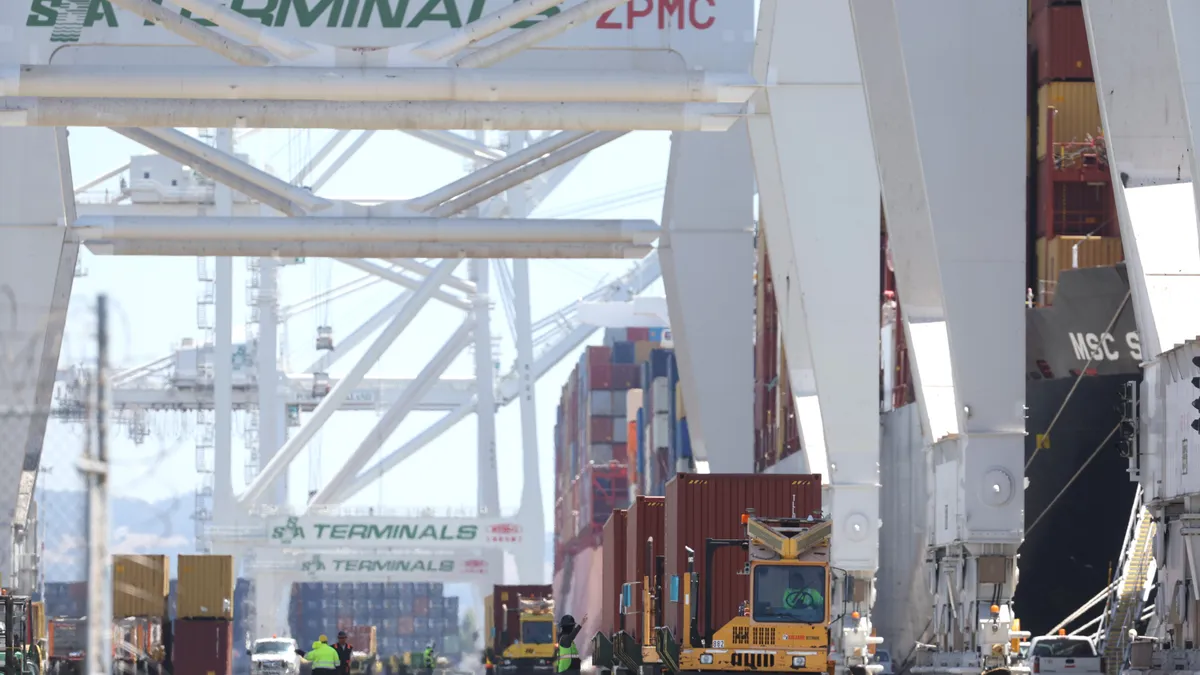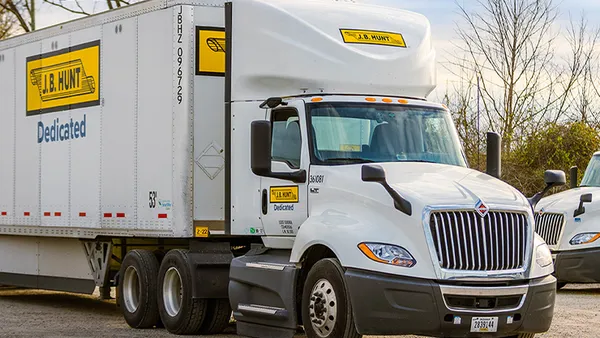UPDATE: June 8, 2022: TraPac’s chassis pit at the Port of Oakland has reopened as of Tuesday, but the terminal operator continued to advise drivers to bring their own chassis as availability remains limited.
Dive Brief:
- The chassis pit at the Port of Oakland has closed, according to multiple alerts over the past week from TraPac.
- “All truckers are required to bring their own chassis for transactions,” the terminal operator said in an email alert on May 26 and several daily updates on its website over the past week.
- The chassis pit closure, amid demand far outstripping supply nationwide, follows repeated advisories from TraPac about limited availability in Oakland since at least 2015.
Dive Insight:
Drivers often face requirements on which chassis can be used for cargo at each terminal, and chassis scarcity is making life more difficult for drayage firms and any shipper hoping to move a container at the terminal.
“If you want to move a box, then you’ve got to bring your own chassis,” Matt Schrap, CEO of the Harbor Trucking Association told Transport Dive. “Well, the problem with that is not everyone has their own chassis.”
In some cases, shippers pay a fee for a pool chassis as part of a haulage contract with their ocean carrier, Schrap said. An empty chassis pit requires drivers to offer an alternative, if they’re able. But that is leading to frustrating conversations between trucking firms and their customers.
“When you go to the shippers and be like, ‘Look, there’s no chassis. I can use my own chassis, but it’s going to cost you X,’” Schrap said, “their response is, ‘But I already paid for a chassis.’”
Trump Administration-era tariffs on chassis from China caused prices to soar, and the pandemic-induced bullwhip of orders that walloped supply chains left the equipment scattered across the country. Semiconductor supply challenges have limited the ability to manufacture new ones.
The chassis pinch has prompted investments in additional supply. TRAC Intermodal signed a deal in March to expand its fleet of marine and specialty chassis, while Consolidated Chassis Management aims to grow the South Atlantic Chassis Pool to 85,000 chassis.
TraPac has been alerting Oakland stakeholders of limited chassis availability for years, before tariffs on chassis from China, the COVID-19 pandemic and semiconductor woes exacerbated supply issues in the trucking industry.
The terminal operator advised drivers to bring their own chassis in October 2015, notifying them at the time the terminal was out of 20-foot and 40-foot chassis. It sent another email in September 2019, warning it was “extremely low” on 40-foot chassis.
“We ... are not accepting Trac 20' or 45' chassis bare in,” the 2019 alert said. “If they are under containers, they will be accepted.”
The advisories in the past week noted the closure of the entire chassis pit, listing “NONE” for 20-foot, 40-foot and 45-foot models. “Below status is subject to change without notice,” the alerts said.
TraPac did not respond to a Transport Dive request for comment.
Robert Bernardo, a Port of Oakland spokesperson, told Transport Dive in an email the lack of chassis has "no direct correlation" to the 7% drop in cargo at the port in April. "Vessel skips, changing vessel schedules and vessel capacity have a greater impact," Bernardo wrote.
"The temporary pop-up empty yard has actually freed up hundreds, if not thousands, of chassis in the past month alone," Bernardo said.
Alejandra Salgado contributed to this article.














